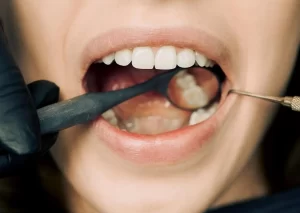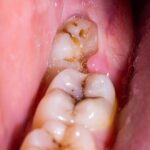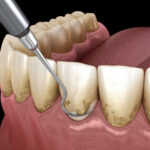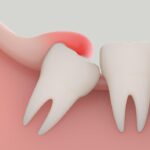How to Kill Tooth Pain Nerve in 3 Seconds Permanently

Tooth pain can be an excruciating experience, often described as sharp, throbbing, or constant. At the heart of this discomfort is the tooth’s nerve, which can become irritated or inflamed due to various factors such as cavities, gum disease, infection, or trauma.
In this article, titled “How to Kill Tooth Pain Nerve in 3 Seconds Permanently,” we will explore innovative and effective methods to not only alleviate tooth pain swiftly but also address the underlying issues to prevent its recurrence.
From home remedies to advanced dental treatments, we will guide you through the most efficient ways to tackle tooth nerve pain head-on, ensuring you can return to your daily activities without the shadow of discomfort looming over you.
Please note, while immediate relief is a priority, you need to consult with a dental professional to ensure the health and safety of your teeth in the long term.
Table of Contents
What causes teeth nerve pain?
Teeth nerve pain originates from the pulp inside the tooth, which houses nerve tissues and blood vessels.
Several factors can lead to nerve pain in the teeth, including:
- Tooth decay: Cavities are one of the most common causes of tooth nerve pain. When tooth decay penetrates through the outer enamel layer into the dentin and reaches the pulp, it can cause inflammation and pain.
- Dental abscess: An abscess is a pocket of pus that forms due to a bacterial infection at the root of the tooth or in the gums. This condition can cause severe pain and requires immediate dental treatment.
- Gum disease: Advanced gum disease (periodontitis) can lead to the deterioration of the supporting structures of the teeth, exposing the roots and potentially affecting the nerve.
- Cracked or chipped teeth: Cracks or chips in a tooth can expose the nerve, making it sensitive to temperature, pressure, or air, leading to pain.
- Bruxism: Grinding or clenching your teeth, especially during sleep, can wear down the enamel and increase tooth sensitivity, sometimes leading to nerve pain.
- Exposed tooth root: Gum recession, often a result of periodontal disease or aggressive brushing, can expose the roots of the teeth, leading to sensitivity and pain.
- Dental procedures: Sometimes, dental work such as fillings, crowns, or root canals can lead to temporary nerve pain due to inflammation or irritation of the tooth pulp.
- Temperature sensitivity: Exposure to extreme hot or cold temperatures, through foods or beverages, can cause sudden, sharp nerve pain, especially if the tooth’s enamel is worn down or the dentin is exposed.
- Acidic foods and beverages: Frequent consumption of acidic foods and drinks can erode tooth enamel and lead to dentin exposure, increasing sensitivity and pain.
- Sinus infections: In some cases, the pain perceived as originating from the teeth may actually be due to sinus pressure or infections, particularly affecting the upper teeth.
What does nerve tooth pain feel like?
Nerve tooth pain, often referred to as dental nerve pain or a toothache, is a distinct and uncomfortable sensation that can vary in intensity and duration depending on the underlying cause.
Here are some common descriptions of what nerve tooth pain feels like:
- Sharp, shooting pain: This type of pain is often sudden and can feel like a sharp jab or jolt in the teeth or gums. It may occur spontaneously or in response to stimuli, such as when eating or drinking hot, cold, sweet, or very acidic foods and beverages.
- Throbbing pain: Many people describe nerve tooth pain as a constant throbbing or pulsating sensation that can be difficult to ignore. This type of pain may intensify over time and often indicates the presence of an infection or abscess.
- Aching and pressure: A dull ache or a feeling of pressure deep within the gums or jaw can signify nerve tooth pain. This sensation may worsen when biting down, chewing, or applying pressure to the area.
- Sensitivity: Increased sensitivity to temperature changes or the pressure of chewing is a hallmark of nerve tooth pain. Teeth may suddenly feel fragile or sore, making eating and drinking uncomfortable experiences.
- Radiating pain: Nerve tooth pain can sometimes extend beyond the source of the problem. Pain may radiate to the jaw, neck, or even the ear, complicating the process of identifying the affected tooth.
- Intermittent pain: In some cases, nerve tooth pain may come and go, presenting as brief episodes of discomfort that seem to resolve before suddenly reappearing.
Kill tooth pain nerve in 3 seconds permanently
Addressing tooth nerve pain quickly and permanently often involves professional dental treatment.
Here are some steps and methods that might be suggested or thought to provide quick relief and long-term solutions, but remember, immediate and permanent relief in exactly 3 seconds is not typically realistic and should be approached with caution:
Immediate Relief Methods
- Cold compress or ice pack: Applying a cold compress or ice pack to the affected area can help reduce inflammation and numb the pain temporarily. This method can provide quick relief but does not address the underlying cause.
- Over-the-Counter pain relievers: Medications such as ibuprofen or acetaminophen can offer rapid relief from tooth nerve pain. They can reduce inflammation and alleviate pain but should be used according to the package instructions or a healthcare provider’s guidance.
- Clove oil: Clove oil contains eugenol, which has natural anesthetic and antibacterial properties. Applying a small amount of clove oil to a cotton ball and dabbing it on the affected area can numb the pain temporarily.
Long-term solutions
- Dental procedures: Various dental procedures can provide a permanent solution to tooth nerve pain, depending on the cause. These include fillings for cavities, root canal treatment for infected tooth pulp, crowns for damaged teeth, and extractions for severely decayed or damaged teeth.
- Good oral hygiene: Maintaining good oral hygiene by brushing twice a day, flossing daily, and using an antiseptic mouthwash can help prevent conditions that lead to tooth nerve pain.
- Regular dental check-ups: Regular visits to the dentist for check-ups and cleanings can help catch and address problems before they lead to severe pain.
IMPORTANT: Consult with a dentist to determine the exact cause of tooth nerve pain. They can provide a diagnosis and recommend the most appropriate treatment.
While some home remedies can provide temporary relief, they may not be suitable for everyone and can sometimes lead to further complications if not used correctly.
Best painkiller for tooth nerve pain
Remember that while painkillers can provide temporary relief, they do not address the underlying cause of the pain. Consulting a dentist for a proper diagnosis and treatment is the way to go.
Here are some of the best painkillers and methods for managing tooth nerve pain:
Over-the-Counter (OTC) Pain Relievers
- Ibuprofen (Advil, Motrin): A non-steroidal anti-inflammatory drug (NSAID) that can help reduce inflammation and pain. It’s often recommended for dental pain because of its effectiveness in reducing swelling and discomfort.
- Acetaminophen (Tylenol): Effective for pain relief, acetaminophen is a good option for those who cannot take NSAIDs. However, it does not reduce inflammation.
- Aspirin: Another NSAID, aspirin can reduce inflammation and alleviate pain. However, it should not be given to children under 16 years of age due to the risk of Reye’s syndrome.
Prescription Pain Relievers
For severe tooth nerve pain, a dentist might prescribe stronger painkillers, such as:
- Prescription-strength NSAIDs: These are more potent than their OTC counterparts and can provide significant relief from dental pain.
- Opioids: In cases of extreme pain, a dentist might prescribe opioids for short-term use. However, due to the risk of addiction and side effects, these are typically a last resort.
Topical Anesthetics
- Benzocaine: Available in gel or ointment form, topical anesthetics like Orajel can be applied directly to the gum to numb the area temporarily.
How to use clove oil to effectively manage tooth nerve pain
Clove oil has been used for centuries as a natural remedy to manage toothache and nerve pain due to its analgesic (pain-relieving) and antiseptic properties.
The active ingredient in clove oil, eugenol, is particularly effective in numbing pain and reducing inflammation.
Here’s how to use clove oil effectively to manage tooth nerve pain:
Materials Needed
- Pure clove oil (available at pharmacies or health food stores)
- Cotton swab or cotton ball
- Carrier oil (such as olive oil or coconut oil), if dilution is necessary
Instructions
- Dilute the clove oil (optional): Clove oil is very potent and can be irritating to the skin and gums if applied in its pure form. To minimize the risk of irritation, you can dilute it with a carrier oil. Mix a few drops of clove oil with a teaspoon of a carrier oil. This step is optional but recommended, especially for those with sensitive skin or gums.
- Prepare the cotton swab or ball: Take a clean cotton swab or a small piece of cotton ball and dip it into the clove oil or the clove oil mixture. You don’t need a lot; just enough to saturate the tip of the swab or the piece of cotton ball.
- Apply to the affected area: Gently apply the clove oil-soaked swab or cotton ball directly to the tooth or gum area that is causing pain. Avoid touching other areas of the mouth to prevent irritation.
- Leave it on for a few minutes: Allow the clove oil to sit on the affected area for 5 to 10 minutes. You should begin to feel a numbing sensation as the eugenol takes effect.
- Rinse your mouth: After the time has elapsed, remove the cotton swab or ball and rinse your mouth with lukewarm water to remove any residual oil. This will also help prevent any potential irritation from prolonged exposure to eugenol.
Additional Tips
- Use sparingly: Clove oil is very strong, and a little goes a long way. Start with a small amount to see how your body reacts before applying more.
- Frequency of use: You can apply clove oil up to 2-3 times a day, but it should not be used as a long-term solution. If your tooth nerve pain persists, consult a dentist.
- Allergic reactions: If you have never used clove oil before, test a small amount on your skin first to check for any allergic reaction.
- Avoid swallowing: Try not to swallow clove oil while applying it to your gums or teeth. Ingesting small amounts is generally considered safe, but larger quantities can be harmful.
FAQ on How to kill tooth pain nerve in 3 seconds permanently
How do you stop nerve pain in your tooth ASAP?
To stop nerve pain in your tooth ASAP, apply a cold compress to the area for temporary relief, use over-the-counter pain relievers like ibuprofen, and apply clove oil to the affected tooth. These are temporary solutions, and seeing a dentist as soon as possible is the best choice for a permanent fix.
How do you deaden a tooth nerve?
Deadening a tooth nerve involves professional dental procedures, such as a root canal, where the dentist removes the affected nerve tissue from within the tooth, relieving pain and preserving the tooth’s structure.
Does salt water kill nerve pain?
Rinsing with salt water doesn’t kill nerve pain, but it can help alleviate toothache and reduce inflammation by cleaning the affected area and removing debris that may contribute to pain. This can provide temporary relief and is beneficial for oral health, but it’s not a cure for underlying conditions causing nerve pain. For persistent pain, it’s important to seek dental treatment.
What is the best pain relief for exposed tooth nerve?
The most effective immediate relief for an exposed tooth nerve involves using over-the-counter pain relievers like ibuprofen or acetaminophen, combined with topical numbing agents such as dental gels containing benzocaine. The definitive treatment, addressing the root cause through professional dental procedures like fillings, root canal therapy, or crowns, is essential for long-term relief. Consulting a dentist promptly is crucial to prevent further complications.
Do muscle relaxers help with tooth nerve pain?
Muscle relaxers are not typically used to treat tooth nerve pain directly because they work by relieving muscle tension rather than addressing the pain’s source within the tooth or nerve. In cases where the toothache is exacerbated by or causing muscle tension, particularly in the jaw (as with conditions like TMJ disorders), a dentist or doctor might prescribe muscle relaxers to help alleviate the overall discomfort. This can indirectly reduce the pain by relaxing the jaw muscles, potentially easing the strain on the affected area and providing some relief.
What’s the best painkiller for severe toothache relief?
For severe toothache relief, the best painkiller is often considered to be Ibuprofen (Advil, Motrin), especially if inflammation is a contributing factor to the pain. Ibuprofen is a non-steroidal anti-inflammatory drug (NSAID) that can help reduce inflammation and alleviate pain effectively. When taken as directed, it can provide significant relief for dental pain.
In cases where ibuprofen is not suitable or if additional pain relief is needed, Acetaminophen (Tylenol) can be an alternative. It’s especially useful for individuals who cannot take NSAIDs due to medical reasons.
How many painkillers can you take in a day for a toothache?
The maximum number of painkillers you can take in a day for a toothache depends on the type of painkiller:
– Ibuprofen (Advil, Motrin): Adults can generally take up to 400 mg every 4 to 6 hours as needed. Do not exceed 3200 mg in 24 hours.
– Acetaminophen (Tylenol): The maximum recommended dose for adults is 650 to 1000 mg every 4 to 6 hours, not exceeding 3000 mg per day. Some newer guidelines suggest staying below 2000 mg to reduce the risk of liver damage.
Always follow the dosage instructions on the package or those given by a healthcare professional. Overuse of painkillers can lead to serious side effects. For persistent toothache, consult a dentist to address the underlying cause rather than relying solely on painkillers for relief.
Why are painkillers not helping your toothache?
Painkillers may not help your toothache if the underlying cause is not addressed, such as an infection, abscess, or severe decay that affects the tooth’s nerve. Over-the-counter painkillers may not be strong enough to alleviate severe dental pain, and some conditions require specific treatments like antibiotics, root canal therapy, or dental surgery to effectively relieve pain.
Fact Checked
Our dedicated team rigorously evaluates every article and guide to ensure the information is factual, up-to-date, and free of bias.
Updated Regularly
We update our articles and reviews regularly to ensure you have access to the latest data in the dental industry.
The content on Dental3DU’s blog is intended for educational purposes only. This information should not be relied upon as professional medical counsel. Be sure to always consult with your dentist about the dangers and benefits of any medication, treatment or procedure.







